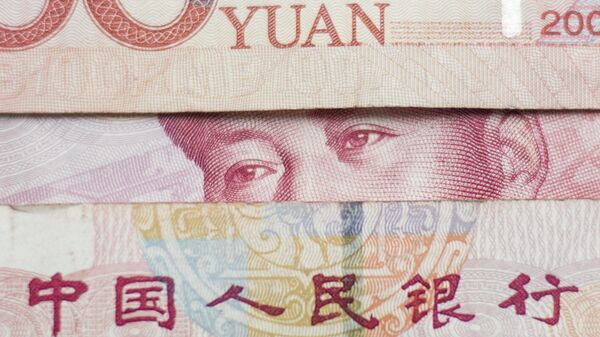China may soon become the first cashless country in the world. The crux of the matter is that the Celestial Empire can boast of well-developed mobile payment services, Guo Tianyong, director of the Center of Banking at the Central University of Finance and Economics, told Sputnik.
"Although in the US there are mobile payment services, such as Apple Pay, in China they are developed much better," Guo explained in an interview with Sputnik China. "However, at the same time, banking services are less developed. For example, the use of bank cards is less spread, and this helps us."
The academic elaborated that for the Chinese civilians who mostly deal with cash the mobile payment has become a real breakthrough: "A person can forget a bank card, while his mobile phone is always with him."
"For sellers, mobile payments are also more convenient," Guo continued. "One needs expensive equipment to accept a bank card, for example, a POS terminal. Small traders often cannot afford it. On the other hand, to carry out mobile payments the merchant just needs to start an electronic wallet and print his QR code. Therefore, mobile payments in China are much easier and more convenient for all."
Clearly, non-cash payments have proven to be safer. Of course, theoretically, hackers can crack an electronic wallet, Guo said, adding, however, that bank card holders are similarly facing risks of fraud.
He emphasized that "no payment method can be absolutely safe." "However, good always triumphs over evil, and Chinese technologies in the field of preventing cybercrime are constantly evolving," the academic stressed.
The mobile payment market is growing by leaps and bounds in China. In 2016, the total volume of mobile payments reached $5.5 trillion. This is 50 times more than that of the US market, which totals $112 billion.
In China's large cities, like Beijing, Shanghai, Guangzhou and Hangzhou, payments via mobile devices are accepted almost everywhere. More than 80 percent of supermarkets are accepting payments through Alipay or WeChat Pay while a similar number of small shopkeepers provide their customers with their QR code when accepting payments. Furthermore, one can even make donations to temples via his or her mobile phone.

Back in 2006, China lagged behind other countries in terms of non-cash settlements. Cash was 13 percent of the country's GDP, while in the United States it was only 6.4 percent, and in Great Britain it was 3.5 percent. However, this year, according to KPMG, a global network of professional firms providing audit, tax and advisory services, 84 percent of Chinese citizens prefer mobile payments. For comparison's sake, in the US only 20 percent of smartphone owners use them to make purchases.
Alipay and WeChat Pay, have emerged as China's two dominant mobile payment platforms. According to the South China Morning Post, Alipay boasts more than 520 million active users.
What's behind the mobile payment systems popularity?
The answer may seem paradoxical: technical backwardness is sometimes useful, Guo says. Countries that are not burdened by the existing infrastructure can develop the most advanced technologies from scratch.

A recent study by French consulting firm Capgemini and international banking group BNP Paribas says that China is likely to become the global leader in digital payments by 2020, surpassing the US.
"By 2020, it is highly likely that emerging economies will be the powerhouses of global non-cash transaction volumes growth, with China most likely challenging the US as the leading market," the report said, adding that the Celestial Empire will see growth of 36 percent over the next five years.
Meanwhile, the October UN report "Information Economy Report 2017: Digitalization, Trade and Development" predicted that mobile payments may outperform credit cards in online commerce as early as 2019.






